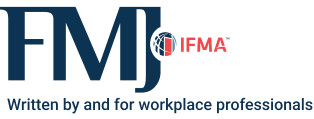Behind the Brand

How is OfficeSpace Software responding to the ever-changing needs of the FM world?
eaders around the world are facing: the hybrid workplace is here to stay, and companies must be in a position to pivot quickly, leveraging real-time data and analytics that provide the insight they need to make effective business decisions.
We know that the current reality of the workplace is hybrid, which typically means two things for the traditional workplace: companies must use their existing real estate to address employee needs by creating a better workplace experience, and they must right-size their real estate portfolio to optimize space.
OfficeSpace offers companies data-driven solutions to improve their workplaces through effective space planning and real estate portfolio management. Whether through intuitive space management tools like Scenarios or Stack Plans that enable planners to test out different scenarios and plan on large or small scales, or through real estate portfolio management to track utilization, occupancy and leases, OfficeSpace provides both the data and the tools to turn data into actionable insights.
Using advanced analytics, companies can collect, analyze and integrate complex data from multiple sources, providing deeper insights that can result in better predictions and recommendations around the workplace. This, in turn, enables companies to fully understand their unique set of needs and embrace the hybrid workplace in an efficient way.
How is OfficeSpace Software changing the FM industry?
Before the pivot to hybrid work models, there were two major assumptions that people had for managing the workplace: people need to be in the office in order to do their work; and everyone therefore needs an assigned seat in the office. Now that neither of these beliefs are true, companies and FMs need to pivot and embrace the new hybrid normal.
FMs and space planners must ask (and answer) much more complex questions: How many people have reserved seats today? How many people have reserved rooms? And how do we know whether they actually showed up or not? Without advanced analytics tools, nobody has a good idea of what is happening in their workplace.
Many organizations’ workplace data lives in silos. Visitors might be in one analytics platform, room bookings in a separate dashboard, people swiping badges in another, and a whole other system for space management. It might have been nice to have these all.
Tell us about your environmental, social and governance efforts or projects. How have these contributed to the community?
With several physical workplaces in different countries (USA, Canada and Costa Rica), OfficeSpace is well positioned to offer volunteer opportunities in multiple locations, helping a variety of communities.
In terms of giving back to the community, the company regularly volunteers to support a number of environmental and social causes. Our Atlanta staff recently volunteered at the Chattahoochee Nature Center, a private, non-profit environmental education facility that focuses on educational outreach through the use of live flora and fauna. Meanwhile, our Canadian team volunteered with Soap for Hope, an organization that changes lives by providing hope and dignity through hygiene; and our colleagues in Costa Rica teamed up with the environmental conservation organization Green Wolf.
Additionally, OfficeSpace signed the Vista Climate Pledge, a global emissions measurement and reduction strategy through Vista Equity Partners. We joined more than 50 enterprise software companies in committing to measure greenhouse gas emissions and take action on climate change with this industry-leading effort.
OfficeSpace believes that improving the workplace experience starts with our own company. We are a diverse team of creative people who care deeply about solving tough problems, pushing the boundaries of what a workplace management platform can be and supporting one another in the process. We embrace unbiased hiring practices that emphasize diversity, equity and inclusion, and our values are designed around trust, ownership and innovation.






